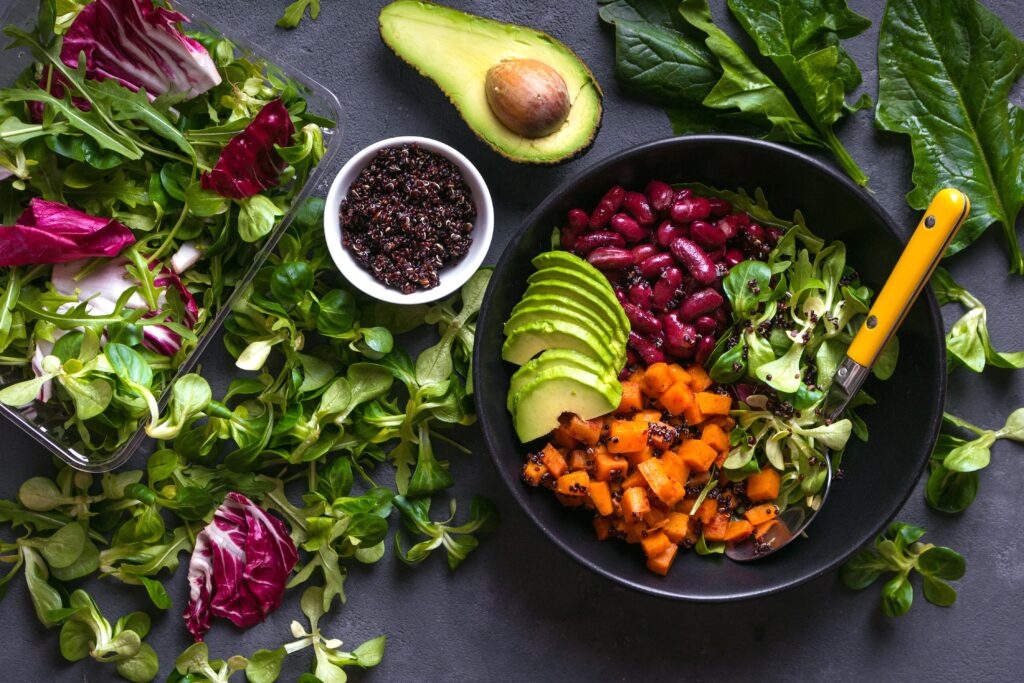Vegan and vegetarian diets have grown in popularity in recent years, not only for ethical and environmental reasons but also for potential health benefits such as weight loss. With the right approach, a vegan or vegetarian diet can help you lose weight and improve your overall health. In this blog, we will look at the fundamentals of vegan and vegetarian diet plans for weight loss and overall health, offering you useful insights, tips, and sample meal plans.
Understanding Vegetarian and Vegan Diets
Before diving into diet plans, it is critical to understand the basics of vegan and vegetarian diets.
Vegan diets exclude all animal products, including meat, dairy, eggs, and even honey. It is primarily composed of plant-based foods such as fruits, vegetables, grains, legumes, nuts, and seeds.
A vegetarian diet varies, but it generally excludes meat and seafood while allowing dairy and eggs. There are variations, such as lacto-vegetarian (allows dairy), ovo-vegetarian (allows eggs), and lacto-ovo-vegetarian (allows both dairy and eggs).
The Benefits of Vegan and Vegetarian Diets

Weight Loss: Vegan and vegetarian diets are typically lower in calories and saturated fats, making them weight loss friendly.
Reduced Risk of Chronic Diseases: Research has shown that these diets can lower the risk of heart disease, diabetes, and certain cancers.
Improved Digestion: A plant-based diet can help with digestion and regular bowel movements.
Increased Energy: Due to the high nutrient content of vegan and vegetarian foods, many people report feeling more energized.
Environmental Impact: Because these diets use fewer natural resources and emit fewer greenhouse gases, they have a lower carbon footprint.
Making a Weight Loss Vegan or Vegetarian Diet Plan
To begin a vegan or vegetarian diet for weight loss, careful planning is required. Here’s a step-by-step procedure:
1. Determine Your Nutritional Requirements: Consult a dietitian or nutritionist to determine your calorie and nutrient needs.
2. Establish Realistic Goals: Set attainable weight loss goals and timelines. Aim for gradual and long-term weight loss, ideally 1-2 pounds per week.
3. Eat Whole Foods: Prioritize whole, unprocessed foods such as fruits and vegetables, whole grains, legumes, and nuts. Avoid highly processed vegan or vegetarian junk food.
4. Portion Control: Excessive consumption of even healthy foods can lead to weight gain. Keep portion sizes in mind.
5. Include Plant-Based Proteins: Include plant-based proteins like tofu, tempeh, legumes, and quinoa in your diet to help with muscle maintenance and satiety.
6. Include Healthy Fats: Include sources of healthy fats such as avocados, nuts, seeds, and olive oil to promote fullness and nutrient absorption.
Sample Vegan and Vegetarian Meal Plans
Here are some sample meal plans to give you an idea of what a day might look like on a vegan or vegetarian diet for weight loss:
Vegan Meal Plan
Vegan smoothie with spinach, banana, chia seeds, and almond milk for breakfast.
Quinoa and black bean salad with roasted vegetables for lunch.
Carrot sticks with hummus for a snack.
Dinner will be vegan chili with brown rice and a mixed greens salad.
Snack: a bowl of mixed berries with a dollop of coconut yogurt.
Vegetarian Meal Plan (Lacto-Ovo-Vegetarian)
Breakfast: Greek yogurt with mixed berries and a sprinkle of nuts.
Lunch: Grilled vegetables and feta cheese wrap with a side of couscous salad.
Snack: Sliced apples with peanut butter.
Dinner: Baked eggplant Parmesan with whole-grain pasta and a green salad.
Snack: Sliced mango with a squeeze of lime.
Vegan and vegetarian diets can help you lose weight while also providing numerous health benefits. When thoughtfully planned and executed, these diets can help you achieve your weight loss goals while also promoting overall well-being.



